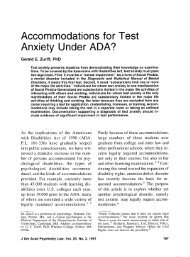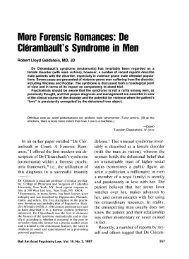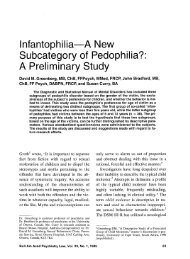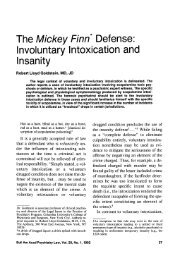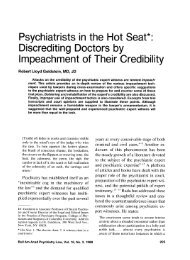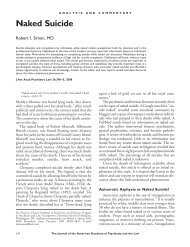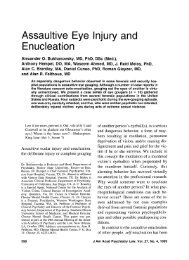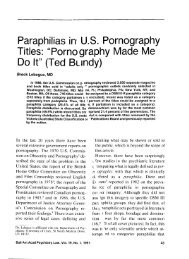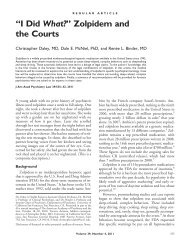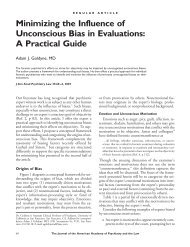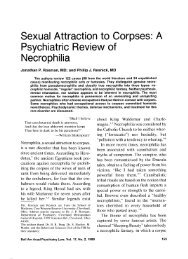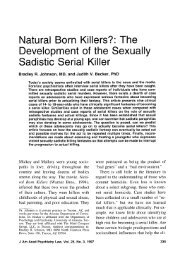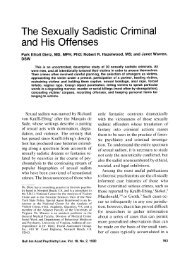Tarasoff at Twenty-Five - Journal of the American Academy of ...
Tarasoff at Twenty-Five - Journal of the American Academy of ...
Tarasoff at Twenty-Five - Journal of the American Academy of ...
You also want an ePaper? Increase the reach of your titles
YUMPU automatically turns print PDFs into web optimized ePapers that Google loves.
The important distinction among <strong>the</strong>se jurisdictions<br />
is th<strong>at</strong> in four <strong>of</strong> <strong>the</strong>m—Illinois, New York,<br />
Oregon, and Texas—<strong>the</strong> <strong>the</strong>rapist ostensibly has<br />
true discretion whe<strong>the</strong>r to disclose or not. The Illinois<br />
st<strong>at</strong>ute contains <strong>the</strong> unique phrase, “in <strong>the</strong> <strong>the</strong>rapist’s<br />
sole discretion”:<br />
. . . communic<strong>at</strong>ions may be disclosed. . .when, and to <strong>the</strong> extent,<br />
in <strong>the</strong> <strong>the</strong>rapist’s sole discretion, disclosure is necessary to<br />
warn or protect a specific individual against whom a recipient<br />
has made a specific thre<strong>at</strong> <strong>of</strong> violence .... 46<br />
How absolutely an Illinois court will construe “sole<br />
discretion” remains to be seen.<br />
New York’s st<strong>at</strong>ute provides for permissive disclosure<br />
“to an endangered individual and a law enforcement<br />
agency when a tre<strong>at</strong>ing psychi<strong>at</strong>rist or psychologist<br />
has determined th<strong>at</strong> a p<strong>at</strong>ient or client presents<br />
a serious and imminent danger to th<strong>at</strong> individual. . .”<br />
and <strong>the</strong>n emphasizes: “Nothing in this paragraph<br />
shall be construed to impose an oblig<strong>at</strong>ion upon a<br />
tre<strong>at</strong>ing psychi<strong>at</strong>rist or psychologist to release inform<strong>at</strong>ion<br />
pursuant to this paragraph.” 47 As in Illinois,<br />
this limiting language has not yet been judicially<br />
construed.<br />
Oregon’s st<strong>at</strong>ute, like New York’s, uses permissive<br />
language—“ a clear and immedi<strong>at</strong>e danger to o<strong>the</strong>rs<br />
or to society may be reported to <strong>the</strong> appropri<strong>at</strong>e authority”—and<br />
<strong>the</strong>n declares: “A decision not to disclose<br />
inform<strong>at</strong>ion under this subsection shall not<br />
subject <strong>the</strong> provider to any civil liability.” 48 Oregon’s<br />
highest court has examined this language and has<br />
unanimously accepted its plain meaning—“may”<br />
means may, not must. 7 One problem with Oregon’s<br />
st<strong>at</strong>ute is th<strong>at</strong> it applies only to “providers,” defined<br />
as public institutional mental health agencies and<br />
<strong>the</strong>ir staffs, leaving <strong>the</strong> law unclear for priv<strong>at</strong>e<br />
practitioners. 7<br />
The Texas st<strong>at</strong>ute unambiguously permits but<br />
does not require disclosure to law enforcement <strong>of</strong> a<br />
p<strong>at</strong>ient’s thre<strong>at</strong>s but does not require or permit disclosure<br />
to anyone else (including <strong>the</strong> victim). The<br />
Texas Supreme Court in Thapar v. Zezulka 52 emph<strong>at</strong>ically<br />
interpreted <strong>the</strong> st<strong>at</strong>ute to mean exactly<br />
wh<strong>at</strong> it says, fl<strong>at</strong>ly rejecting any <strong>Taras<strong>of</strong>f</strong> duty in<br />
Texas. Thus in Texas a <strong>the</strong>rapist has, by dint <strong>of</strong> <strong>the</strong><br />
law <strong>at</strong> least, no dilemma, morally or legally. If <strong>the</strong><br />
<strong>the</strong>rapist wants to warn, he or she may notify <strong>the</strong><br />
police (not <strong>the</strong> victim). If <strong>the</strong> <strong>the</strong>rapist wants to<br />
maintain <strong>the</strong> sanctity <strong>of</strong> confidentiality (or is unconvinced<br />
<strong>the</strong> thre<strong>at</strong> is serious), he or she may remain<br />
silent, incurring no legal exposure.<br />
Herbert and Young<br />
Volume 30, Number 2, 2002<br />
All <strong>of</strong> <strong>the</strong> o<strong>the</strong>r permission jurisdictions—Alaska,<br />
Connecticut, <strong>the</strong> District <strong>of</strong> Columbia, Florida,<br />
Rhode Island, and West Virginia—leave troublesomely<br />
open <strong>the</strong> possibility th<strong>at</strong> a court may engraft<br />
a duty onto permission (all <strong>the</strong> more likely, because<br />
<strong>the</strong> st<strong>at</strong>utory grant <strong>of</strong> permission carries with it ipso<br />
facto immunity from liability for breach <strong>of</strong> confidentiality).<br />
Thus, prudence milit<strong>at</strong>es for tre<strong>at</strong>ing <strong>the</strong>se as<br />
duty st<strong>at</strong>es.<br />
The Anti-<strong>Taras<strong>of</strong>f</strong> Jurisdiction<br />
In Nasser v. Parker, 53 <strong>the</strong> Virginia Supreme Court<br />
rejected a <strong>Taras<strong>of</strong>f</strong> duty, where a voluntary psychi<strong>at</strong>ric<br />
inp<strong>at</strong>ient, under tre<strong>at</strong>ment for anger and depression<br />
over a romantic rejection, was allowed to leave<br />
<strong>the</strong> hospital and went to his erstwhile lover’s home<br />
and killed her (<strong>the</strong>n killed himself). Although <strong>the</strong><br />
admitting psychi<strong>at</strong>rist had tre<strong>at</strong>ed <strong>the</strong> p<strong>at</strong>ient for 17<br />
years and well knew his “history <strong>of</strong> violence toward<br />
women who rejected him and . . . th<strong>at</strong> [he] recently<br />
had thre<strong>at</strong>ened [<strong>the</strong> victim],” <strong>the</strong> court rejected liability<br />
for failure to warn. Terming <strong>Taras<strong>of</strong>f</strong> “unpersuasive,”<br />
<strong>the</strong> court ruled:<br />
[W]e disagree with <strong>the</strong> holding <strong>of</strong> <strong>Taras<strong>of</strong>f</strong> th<strong>at</strong> a doctor-p<strong>at</strong>ient<br />
rel<strong>at</strong>ionship or a hospital-p<strong>at</strong>ient rel<strong>at</strong>ionship alone is sufficient,<br />
as a m<strong>at</strong>ter <strong>of</strong> law, to establish a “special rel<strong>at</strong>ion” under Rest<strong>at</strong>ement<br />
[<strong>of</strong> Torts] § 315(a). . . [T]here must be added. . .<strong>the</strong> factor.<br />
. .<strong>of</strong> taking charge <strong>of</strong> <strong>the</strong> p<strong>at</strong>ient . . . meaning th<strong>at</strong> <strong>the</strong> doctor<br />
or hospital must be vested with a higher degree <strong>of</strong> control<br />
over <strong>the</strong> p<strong>at</strong>ient than exists in an ordinary doctor-p<strong>at</strong>ient or<br />
hospital-p<strong>at</strong>ient rel<strong>at</strong>ionship before a duty arises concerning <strong>the</strong><br />
p<strong>at</strong>ient’s conduct [Ref. 53, pp 505–6]<br />
Given <strong>the</strong> facts <strong>of</strong> <strong>the</strong> case, this is a strong st<strong>at</strong>ement,<br />
by a unanimous court. The psycho<strong>the</strong>rapistp<strong>at</strong>ient<br />
rel<strong>at</strong>ionship had gone on for 17 years; <strong>the</strong><br />
<strong>the</strong>rapist was aware <strong>of</strong> many acts (not just thre<strong>at</strong>s) <strong>of</strong><br />
violence by <strong>the</strong> p<strong>at</strong>ient (including recently holding a<br />
gun to <strong>the</strong> victim’s head); <strong>the</strong> p<strong>at</strong>ient was hospitalized;<br />
<strong>the</strong>re were actual, specific thre<strong>at</strong>s; and <strong>the</strong> victim<br />
had come out <strong>of</strong> hiding in reliance on <strong>the</strong> p<strong>at</strong>ient’s<br />
hospitaliz<strong>at</strong>ion. Still, <strong>the</strong>re was no duty to<br />
keep <strong>the</strong> p<strong>at</strong>ient in <strong>the</strong> hospital or to warn <strong>the</strong> victim<br />
when <strong>the</strong> p<strong>at</strong>ient signed out.<br />
In this light, it is fair to surmise th<strong>at</strong> in Virginia<br />
containment (or “tak[ing] charge”) on <strong>the</strong> order <strong>of</strong><br />
involuntary hospitaliz<strong>at</strong>ion would be necessary to<br />
trigger a <strong>Taras<strong>of</strong>f</strong> duty (e.g., in <strong>the</strong> event <strong>of</strong> elopement<br />
or discharge). Indeed, involuntary hospitaliz<strong>at</strong>ion<br />
was <strong>the</strong> predic<strong>at</strong>e for liability in a recent Virginia<br />
Supreme Court case in which a female p<strong>at</strong>ient was<br />
279




